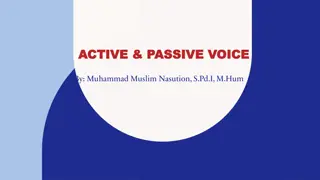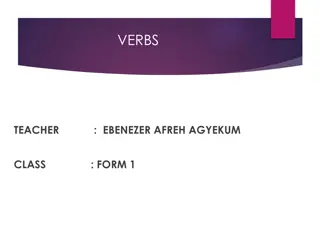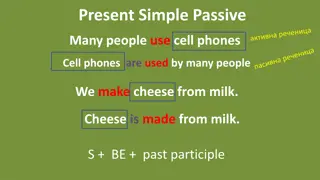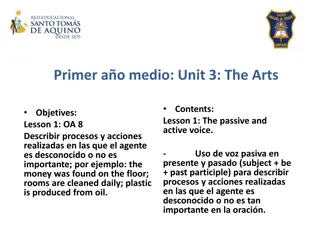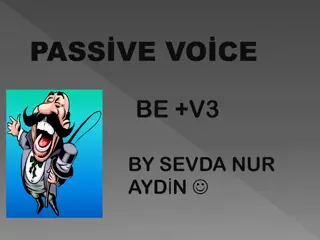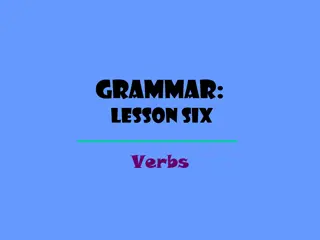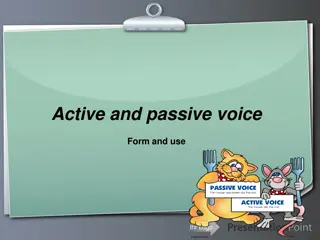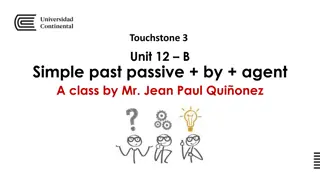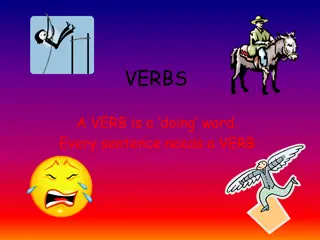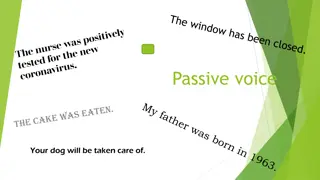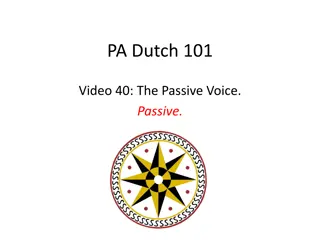Understanding Active and Passive Verbs in English Sentences
Explore the concepts of active and passive verbs in English sentences through examples, identifying subjects and objects, discussing sentence structure, and converting between active and passive forms.
Download Presentation

Please find below an Image/Link to download the presentation.
The content on the website is provided AS IS for your information and personal use only. It may not be sold, licensed, or shared on other websites without obtaining consent from the author. Download presentation by click this link. If you encounter any issues during the download, it is possible that the publisher has removed the file from their server.
E N D
Presentation Transcript
Active and passive verbs What was said just now?
Subject and object (revision) What is the subject of each of these sentences? The dog barked. The dog bit me. I bit the dog. You must get off the bus. This bus goes to Leeds. I am a dog. The dog barked. The dog bit me. I bit the dog. You must get off the bus. This bus goes to Leeds. I am a dog.
Subject and object (revision) What is the object of each of these sentences? Do they all have an object? The dog barked. The dog bit me. I bit the dog. You must go to Leeds on the bus. I m sharpening my pencil. Get a new pencil. The dog barked. The dog bit me. I bit the dog. You must go to Leeds on the bus. I m sharpening my pencil. Get a new pencil.
Discuss with a partner: Every sentence must have a subject. True or false? Example(s) here If you think it s false, give an example of a correctly formed sentence which has no subject.
Discuss with a partner: Every sentence must have an object. True or false? Example(s) here If you think it s false, give an example of a correctly formed sentence which has no object.
All in order object - subject - verb : What is their usual order in an English sentence? Subject Verb Object
Passive verbs A passive verb lets us use the object of the action as the subject of the sentence. The dog bit me. (active verb) I was bitten by the dog. (passive verb)
Turn these active verb sentences into passive verb sentences: Honey is made by bees. He was warmed and dried by the sun. We were nearly flattened by a passing herd of buffalo. My fall was broken by a projecting ledge of rock. Bees make honey. Honey is The sun warmed and dried him. A passing herd of buffalo nearly flattened us. A projecting ledge of rock broke my fall.
Turn these passive verb sentences into active verb sentences: A projecting ledge of rock broke my fall. My fall was broken by a projecting ledge of rock. The robbers were seen by a member of the public. A member of the public saw the robbers.
Grammar nerds corner Passive verbs can be in any tense: past, present, future and so on. That s why it is not called the passive tense but the passive voice of the verb. Examples: It amuses me present tense, active voice. I am amused present tense, passive voice. I was amused past tense, passive voice.
Identify the tense and voice of the verbs in these sentences: I missed the bus yesterday. John will be asked to leave. My hamster eats too much. My hamster was eaten by the cat. My ears were assailed by a howling noise. The dog was howling.
Now create your own sentence using: Present tense, active voice Past tense, passive voice Past tense, active voice Future tense, active voice Present tense, passive voice Future tense, passive voice
Sentences with two objects Find the subject, verb and object of this sentence: My granny gave me a new game for my birthday. My granny gaveme a new game for my birthday. What is the object: me or a new game ? How do we make this sentence passive?
Sentences with two objects My granny gaveme a new game for my birthday. How do we make this sentence passive? There are two ways because there are two objects. A new game is called the direct object it s the thing that was given. Me is called the indirect object you are the person it was given to. So we can say:
Sentences with two objects A new game was given to me by my granny. Or: I was given a new game by my granny. Which one do you think sounds better? Now turn these into passive verb sentences: The head teacher awarded Abbie a prize. Adult birds bring food to their chicks. (Careful with this one! You may need to change things a little to make it sound good.)
Style tips: (1) Dont overdo it! What is this writer trying to say? It is noted that your vehicle has been reported to have been parked improperly and you have consequently been issued with a penalty of 40 which must be paid in full within 30 days. In plain English, this writer is saying four things: 1. You parked in the wrong place. 2. We are fining you 40. 3. Please pay within 30 days. 4. I am a pompous bureaucrat.
Style tips: (2) Use be, not get In spoken English, you can hear people saying things like: We got nicked, or That s how these things get done. That s OK in informal speech but don t use it in your writing, except in dialogue. In standard written English, we use the auxiliary verb (helping verb) to be to form the passive voice. Not to get .
Rewrite these sentences, using the correct form of the passive voice for standard written English: I got stung by a wasp. Plants get pollinated by insects. Proteins get broken down by enzymes in our guts. Trespassers will get prosecuted.
Passive verb forms What have we learned? Tell your partner two things you now know about passive verbs. Listening skills: Be prepared to share with the class what your partner said to you.



